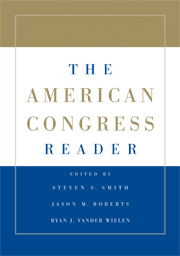Book contents
- Frontmatter
- Contents
- THE AMERICAN CONGRESS READER
- PART I THE AMERICAN CONGRESS: MODERN TRENDS
- PART II REPRESENTATION AND LAWMAKING IN CONGRESS: THE CONSTITUTIONAL AND HISTORICAL CONTEXT
- PART III CONGRESSIONAL ELECTIONS AND POLICY ALIGNMENTS
- PART IV MEMBERS, GOALS, RESOURCES, AND STRATEGIES
- PART V PARTIES AND LEADERS
- PART VI THE STANDING COMMITTEES
- PART VII THE RULES OF THE LEGISLATIVE GAME
- 20 Sample of a Special Rule
- 21 Sample of a Unanimous Consent Agreement
- 22 On the Effects of Legislative Rules
- 23 The Partisan Basis of Procedural Choice
- 24 The Evolution of Agenda-Setting Institutions in Congress
- PART VIII THE FLOOR AND VOTING
- PART IX CONGRESS AND THE PRESIDENT
- PART X CONGRESS AND THE COURTS
- PART XI CONGRESS, LOBBYISTS, AND INTEREST GROUPS
- PART XII CONGRESS AND BUDGET POLITICS
- PART XIII FURTHER READINGS ON CONGRESSIONAL POLITICS
20 - Sample of a Special Rule
Published online by Cambridge University Press: 05 June 2012
- Frontmatter
- Contents
- THE AMERICAN CONGRESS READER
- PART I THE AMERICAN CONGRESS: MODERN TRENDS
- PART II REPRESENTATION AND LAWMAKING IN CONGRESS: THE CONSTITUTIONAL AND HISTORICAL CONTEXT
- PART III CONGRESSIONAL ELECTIONS AND POLICY ALIGNMENTS
- PART IV MEMBERS, GOALS, RESOURCES, AND STRATEGIES
- PART V PARTIES AND LEADERS
- PART VI THE STANDING COMMITTEES
- PART VII THE RULES OF THE LEGISLATIVE GAME
- 20 Sample of a Special Rule
- 21 Sample of a Unanimous Consent Agreement
- 22 On the Effects of Legislative Rules
- 23 The Partisan Basis of Procedural Choice
- 24 The Evolution of Agenda-Setting Institutions in Congress
- PART VIII THE FLOOR AND VOTING
- PART IX CONGRESS AND THE PRESIDENT
- PART X CONGRESS AND THE COURTS
- PART XI CONGRESS, LOBBYISTS, AND INTEREST GROUPS
- PART XII CONGRESS AND BUDGET POLITICS
- PART XIII FURTHER READINGS ON CONGRESSIONAL POLITICS
Summary
Special rules from the House Committee on Rules are the primary means through which nontrivial legislation reaches the House floor. Special rules typically specify the length of floor debate, who controls the debate time, and which, if any, amendments can be considered.
H. RES. 636: SPECIAL RULE FOR H.R. 1908 – PATENT REFORM ACT OF 2007
Resolved, That at any time after the adoption of this resolution the Speaker may, pursuant to clause 2(b) of rule XVIII, declare the House resolved into the Committee of the Whole House on the state of the Union for consideration of the bill (H.R. 1908) to amend title 35, United States Code, to provide for patent reform. The first reading of the bill shall be dispensed with. All points of order against consideration of the bill are waived except those arising under clause 9 or 10 of rule XXI. General debate shall be confined to the bill and shall not exceed one hour equally divided and controlled by the chairman and ranking minority member of the Committee on the Judiciary. After general debate the bill shall be considered for amendment under the five-minute rule. It shall be in order to consider as an original bill for the purpose of amendment under the five-minute rule the amendment in the nature of a substitute recommended by the Committee on the Judiciary now printed in the bill. The committee amendment in the nature of a substitute shall be considered as read.
- Type
- Chapter
- Information
- The American Congress Reader , pp. 243 - 244Publisher: Cambridge University PressPrint publication year: 2008

